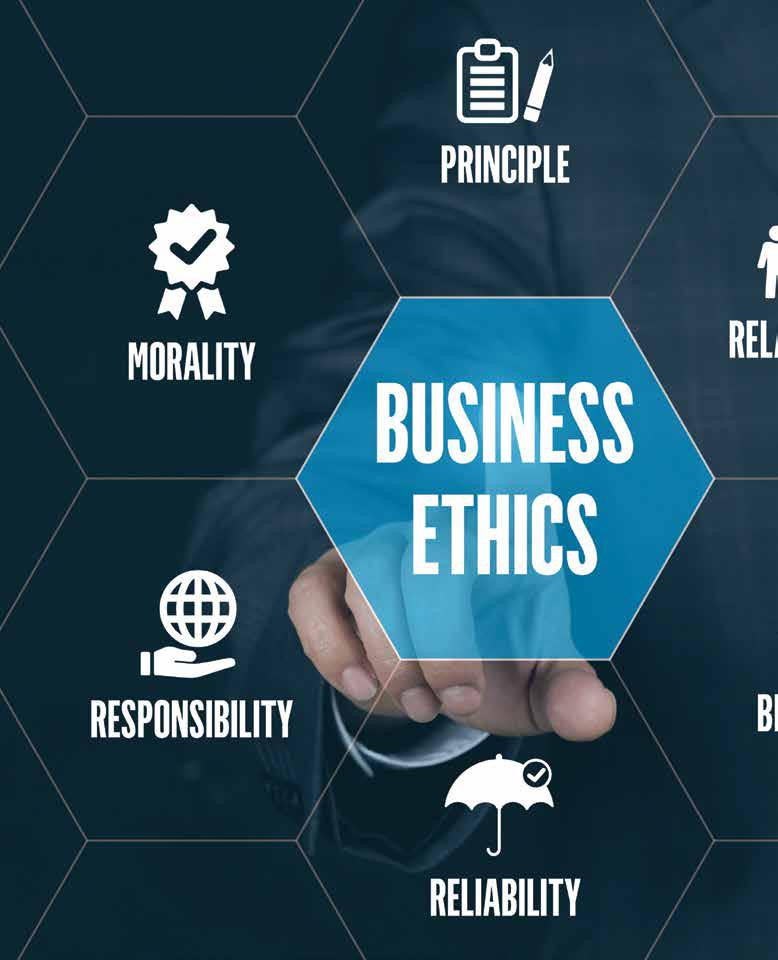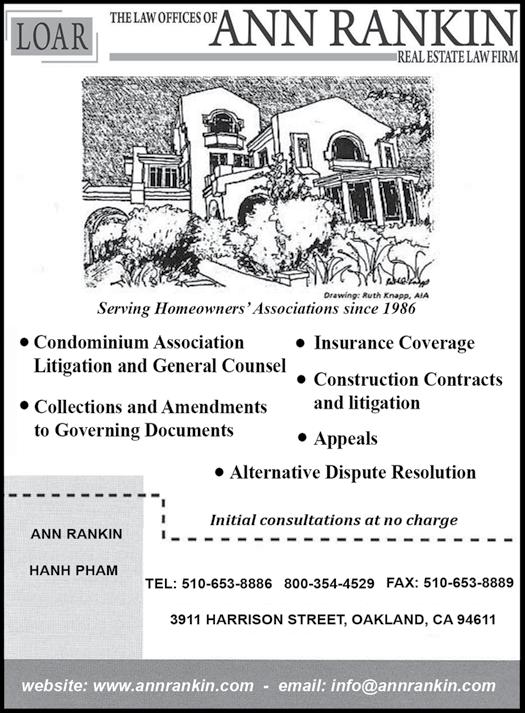
9 minute read
Without Professionalism Success is Out of Reach
By Brittany Montoya-Taylor
For various reasons, community management businesses sometimes send out inexperienced, untrained or otherwise unqualified individuals to act as community managers, at least as a stop-gap measure. While this may seem to be an acceptable practice at a time when qualified candidates are scarce, it is never a good idea for the business, the manager or the community. Community managers represent not only their respective management companies, but the HOA industry as a whole. Establishing relationships with honesty, integrity and professionalism is critical to substantiating the vital importance of community management and further developing the reputation of the industry. It is imperative that management companies acknowledge the importance of their managers’ representation and establish set qualifications and guidelines for the role. The importance of training, both inside and outside of the CACM classroom, cannot be overstated. The role of community manager bears great responsibility. Sending unqualified individuals into the field is not only negligent but a disservice to them as they will be set up to fail. While there will certainly be times when it may be convenient to utilize an assistant or other staff member to fill the role of a community manager for a client, it should not be done.
Given the nature of the work that community managers perform, it is impossible for someone inexperienced to even grasp the real needs of the client. Even though placing such an individual in the role of community manager may appear to work for a brief period of time, something will inevitably fall through the cracks. Gambling and waiting to find out what was missed is not worth the potential liability, fallout or loss of a client that may result.
As the HOA industry strives to establish its importance and professionalism in an ever changing marketplace, management companies must rise to the challenge and exact standards that reflect this mission. Without management companies exercising such practices and standards, success will be out of reach.
Brittany Montoya-Taylor, CCAM, is a community manager with FirstService Residential in Las Vegas, Nevada.
BUILDING YOUR PERSONAL
“Branding?! I thought that was for corporations, not something I had to bother myself with!”
It’s true, corporations spend millions of dollars every year to ensure their brand is in the forefront of the minds of their customers. The point? To ensure THEIR brand is the one that is trusted, shared and purchased more than the competition. Corporations understand that image is everything and that perception is reality.
But did you know that every encounter you have is a form of personal branding? Let's face it. Perception breeds brand identity. With today's digital world, whether you like it or not, you have been developing a personal brand identity. Friends, co-workers, colleagues and the industry you serve are "getting to know your brand" with every interaction they have with you. What does that encounter say about you as a professional and leader within your field? Are you leading the brand or is the brand leading you? If you work for someone else, does your personal brand identity support, or better yet enhance your company’s brand?
CACM believes in educating its members on the importance of personal branding and how it can positively impact the community association industry and your personal journey through it. Join CACM for the 2017 Southern and Northern California Law Seminars for an in-depth session on developing your personal brand. In this hands-on-workshop session taught by PR and Marketing professional Emily Yost, you will take part in exercises meant to challenge the way you view your personal brand. Leave the workshop with key ways to ensure your clients trust and value you, all while boosting your confidence and level of influence within the industry.
For a full line-up of Law Seminar workshops meant to inform, motivate and challenge you in 2017, visit www.cacm.org

ETHICS IN ACTION
Communicate Your Ethics Policy Early and Often
By Ken Kosloff
In browsing through the latest Vision Magazine (Summer 2016), I ran across the “Ethics in Action” article and thought it was really well done. As an industry consultant for over 30 years, I’ve seen ethics (or lack thereof) play a major role in many decisions made by managers and service providers. And, as the article pointed out, in the heat of battle it’s sometimes time consuming and difficult to drop back in our thought progression and remember the basics of what we stand for. That’s why it’s worth delving deeper into the one question the author asked which is “what are your business ethics?” If someone asked you that today, how would you respond?
Few, if any of us, could rattle that answer off the top of our heads. The truth is, our ethical standards are as much about how we feel in our gut as they are about what we might put on paper or verbalize to a client or service provider. So how do we take what’s in our gut and best translate that to those around us in a clear and easy manner? A good solid place to start is with a code of ethics.
Whether you adopt the CACM code of ethics or go a step further and develop your own, you’re utilizing a key opportunity for making your job a lot less dramatic and/or uncomfortable. The fastest way to defuse a potentially volatile or embarrassing situation is to catch and deal with it at the front end. If we proactively let service providers, clients and others with whom we deal know where we stand, there is a substantially reduced

Communicate Your Ethics Policy...
Continued from page 51 chance of having to tell them during what will likely be (by then) a more embarrassing situation. So instead, let’s rip the Band-Aid off now.
While the existing CACM code of ethics is a great place to start, it can have a greater impact if your organization formally adopts its own interpretation of the code and establishes clear employee guidelines to follow. Your code of ethics should explain to others, in plain language, what your expectations are from them, along with what they can expect from you. If a vendor lunch is acceptable, but a cruise on the Mexican Riviera isn’t, that should be communicated sooner rather than later. If a BOD wants you to write a set of specifications for a balcony deck repair project because they would rather not pay a consultant, they need to know that because it’s out of your skill set and therefore your comfort zone (and because you always have their best interests in mind) that it’s not an option you are willing to accept. Just imagine how much more productive and comfortable your job would be if they were discouraged from asking in the first place and you didn’t have to say no.
Your organizations code of ethics should plainly communicate the business relationship with each entity, define boundaries and service expectations, discuss what constitutes a conflict of interest, prerequisites for conduct with clients, and should even go so far as to define what is appropriate conduct with employees. When the base package has been developed, review it internally and get as much feedback as possible. It’s also a good idea to get staff and management together at the same table to flush out and discuss the details. After all, this is a document that everyone will be signing onto, so you want as much buy in as possible.
Once your code of ethics has been adopted, you’re not done yet! This is a living, breathing document that needs to be communicated in all directions, 360 degrees on a regular basis. It should be distributed and discussed at board orientation trainings and meetings and should be sent and discussed with all existing (and especially new!) vendors and business partners. A code of ethics is really your code of conduct. It demonstrations to others what standards are important to your organization and what others can expect of you. But just developing this information and getting it out to everyone initially isn’t enough. We live in an information age that ensures our brains will be filled to capacity with more data than we can process. Statistics show that the average brain today processes in one day what the average brain in the year 1900 processed in one year! If information isn’t reinforced or regularly revisited, it can easily become lost in the shuffle.
That’s why the other part of the equation here is to implement an Ethics Management program which involves managing and discussing ethics in the workplace, regular
education of vendors and business partners and frequent customer communication. Follow-up measures such as this will keep the topic alive, offer on-going support to those who may be struggling with making the correct decisions, and help deal with the grey areas, of which there are many.
Ethical behavior in real time is not just limited to gifts and BOD requests (which may be over the top). It’s about things like only taking on activities in areas in which you are competent, fulfilling the basics of your day to day management contract provisions, staying educated within our ever changing industry and using credit cards appropriately.
Best practices dictate that every organization should have their own ethical standards. Managers shouldn’t be expected to make complex ethical decisions without the support of the CACM code and their own internal organizations code of ethics. Managers should have solid internal support and be guided by the company or organization standards in making consistent and good decisions.
Ken Kosloff is a Senior Construction Consultant with Richard Avelar & Associates.
(408) 345-4000 • http://wm-llp.com
We counsel:
• Condominium Associations • Planned Unit Developments • Mixed Use Associations • Commercial Associations
We provide general counsel to Associations including the following services:

• Construction Defect and Civil Litigation • Dispute Resolution • Governing Document Interpretation • Governing Document Revisions • CC&R and Rules Enforcement • Contract Review and Negotiation • Election and Operating Rules • Fiduciary Obligations & Director Education
Generic Insurance Plans Not Covering Your Needs?
Through our alliance with CID Insurance Programs, we offer our Risk Protection Program SM , a broad assortment of insurance and risk management products designed specifically for the community management industry. That includes Errors and Omissions Professional Liability, Cyber Theft, Director’s & Officers Liability, Master Fidelity and more.
For more information, contact Ané Agostini at 800.922.7283 or ane@cidinsurance.com, or visit www.cidinsuranceprograms.com.
Community Association Loans All the right tools for your next project.
How will you fund your next community project? Get the job done right with the Community Association Loan toolkit. You’ll get custom financing that’s perfect for your budget and your community. Your Community Association Loan toolkit includes: • Competitive interest rates • Flexible payment plans • Innovative loan structures • Fixed rate loans • Non-revolving lines of credit Get the cash you need today.
Lisa Ann Rea VP/Regional Account Executive 805.907.8452 Toll Free 866.800.4656, ext. 7500
lisa.rea@ mutualofomahabank.com Jack Brandt AMS AVP/Regional Account Executive 510.921.0124 Toll Free 866.800.4656, ext. 7579
jack.brandt@ mutualofomahabank.com
Brendan Concannon Regional Account Executive 619.961.6346 Toll Free 866.800.4656, ext. 7480 brendan.concannon@mutualofomahabank.com
Member FDIC • Equal Housing Lender Equal Housing Lende National Corporate Member of Community Associations Institute CACM Affiliate Member







